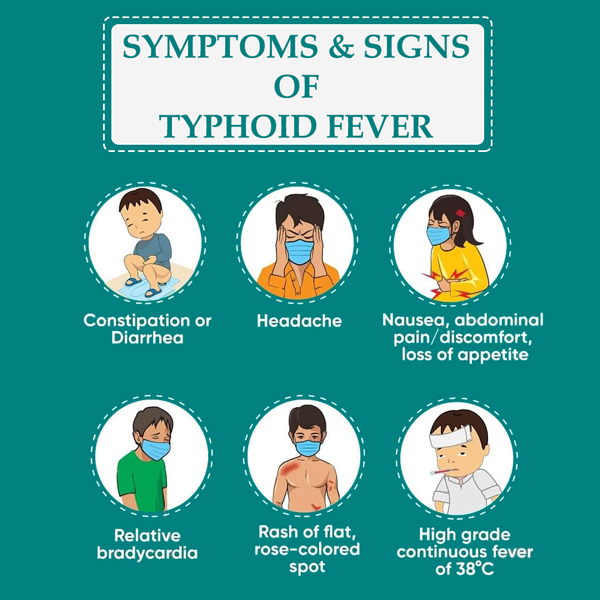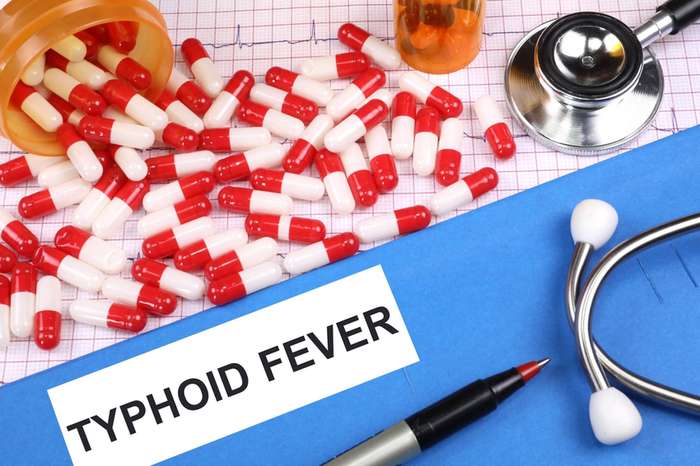Typhoid is also referred to as typhoid fever or enteric fever. Typhoid is a bacterial infection that causes diarrhoea and a rash. Salmonella typhi is the bacteria that causes typhoid fever. In developed countries, typhoid fever is uncommon. It remains a severe health danger in the developing world, particularly in children.
Typhoid fever is caused by infected food and drink and intimate contact with infected people.
Most people with typhoid fever recover within a few days of antibiotic therapy, but very few may die due to health problems. Typhoid fever vaccines are only partly successful. Vaccines are usually reserved for people who may have been revealed to the disease or will be planning to travel to areas where typhoid fever is widespread.
Typhoid symptoms
The signs and symptoms of the disease are likely to appear slowly, usually one to three weeks after contracting the disease.


Early sickness
- Weakness and tiredness
- Sweating
- Appetite loss and weight loss
- Constipation or diarrhoea
- a stomach that is extremely swollen
- Coughing that is dry
- Fever that begins low and progressively rises, potentially reaching 104.9 F. (40.5 C)
You Can Book Typhoid tests to diagnose and other Lab Tests on BookmeriLab. India’s Most Trusted Booking Lab portal. BookmeriLab provides the best-Discounted price on all Ultrasound tests, MRI and CT scans, Blood tests and full-body health check-ups.
Illness in the future
Without treatment, you could:
- Turn delirious
- You may be motionless and drained in the typhoid state, with your eyes half-closed.
At this time, life-threatening complications are common.
Signs and symptoms may reappear in some people up to two weeks after the fever has quieted down.
Causes of Typhoid
Typhoid fever is caused by the dangerous bacteria Salmonella typhi. Salmonella typhi is associated with the bacteria that cause salmonella poisoning, another serious intestinal infectious disease, but they are not the same.
Route of transmission: feces-oral
The majority of persons in wealthy countries acquire typhoid bacteria while travelling. Once infected, they can spread the disease to others via the fecal-oral route. This means infected persons transmit Salmonella typhi in their faeces and sometimes in their urine. You can become infected if you eat food handled by someone who has typhoid fever and hasn’t sanitized their hands thoroughly after using the restroom.
When typhoid fever is present in a developing country, most people get sick from consuming polluted water. The bacterium can also be transferred by contaminated food or close communication with an infected person.
Untreated, approximately 3% of infected people become asymptomatic carriers of Salmonella typhi. This means they continue to shed bacteria in their faeces for at least a year and often for the rest of their lives, despite having no typhoid symptoms. Every country has a small number of typhoid carriers.
When should you see a doctor?
If you suspect you have typhoid fever, see a doctor right away.
Consider seeing a doctor who specialized in international travel medicine or infectious diseases after you return home if you develop signs and symptoms. A doctor with expertise in these fields may be able to accurately diagnose your disease more quickly.
Treatment of Typhoid


- Antibiotics are used to treat typhoid fever because they kill the Salmonella bacteria. The fatality rate is 20%, previous to the use of antibiotics. Excessive infection, pneumonia, intestinal bleeding, or intestinal perforation were mortality reasons. Mortality has been lowered from 1% to -2 %, thanks to antibiotics and supportive care. With the proper antibiotics, symptoms usually improve within one to two days, and results take seven to ten days.
- Oral rehydration solution is the primary treatment for typhoid, as it is for most other diarrheal diseases. Antibiotics (e.g., ceftriaxone, levofloxacin, ciprofloxacin) are often used to cure typhoid, which generally resolves symptoms in less than one week. Glucocorticoids, such as dexamethasone, could also be used to treat severe typhoid.
- Several antibiotics are effective in treating typhoid fever. For many years, chloramphenicol was the drug of choice. Other effective antibiotics have replaced chloramphenicol due to severe rare side effects. Antibiotics are chosen based on the geographic region where the infection was diagnosed. Patients retreat with antibiotics if they recur.
- Those who acquire chronic illness (about 3% – 5% of those infected) can be cured with long-term antibiotics. Removing the gallbladder, which is the source of the chronic infection, is enough to treat it.
To avoid infecting others, take the following precautions
Following precautions will help keep people safe while you recover from typhoid fever:
- Take your antibiotics as recommended
Consume your antibiotics according to your doctor’s advice, and make sure you finish the whole treatment.
- Wash your hands frequently
This is the primary key to preventing the infection from spreading to others. Wash thoroughly for at least 30 seconds with warm, soapy water, especially before eating and after using the washroom.
- Avoid touching food
Cooking for others should be avoided until your doctor says you’re no longer infectious. You won’t be allowed to return to work if you work in the food service industry or a health care facility until tests reveal that you are no longer going to shed typhoid bacteria.
Disclaimer:
The Site cannot and does not contain medical or mental health advice. The medical mental health information is provided for general informational and educational purposes only and is not a substitute for professional advice. Accordingly, before taking any actions based upon such information, we encourage you to consult with the appropriate professionals. We do not provide any kind of medical or mental health advice, other than those based on personal experience.


